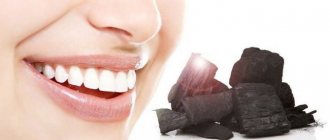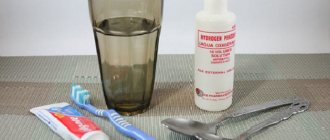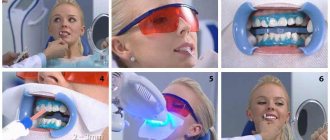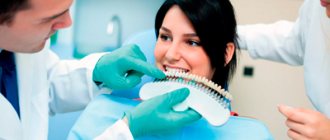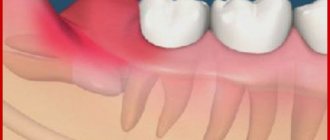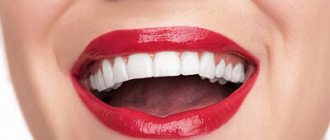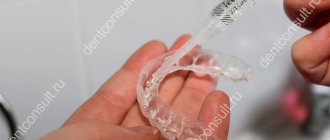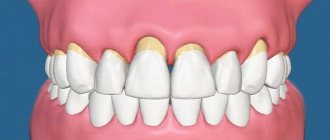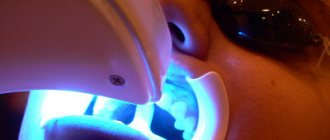The easiest way to whiten enamel at home is to rinse your mouth and brush your teeth with products made from hydrogen peroxide and soda.
There are many recipes for lightening compositions made from these ingredients, but they all have certain contraindications and side effects, which should be known before the procedure.
Treating teeth with hydrogen peroxide: benefits and harms
Tooth enamel whitens after treatment with hydrogen peroxide due to the release of oxygen during a chemical reaction.
It penetrates the plaque, oxidizes its particles and thereby gently cleanses the teeth.
If, upon entering the mouth, peroxide begins to foam, it means that the substance eliminates dead areas of soft tissue, blood clots and exudate. If there are any ulcers or unhealed sores on the mucous membranes of the oral cavity, peroxide can increase their healing time. Therefore, before starting the procedure, it is necessary to completely cure stomatitis, periodontitis, bleeding gums and other dental diseases.
To safely whiten your teeth at home, you need to use 3% hydrogen peroxide. There is no point in looking for more concentrated preparations in order to increase the effectiveness of lightening in cases of pronounced yellowing of teeth. They will not whiten the enamel any more, but will only harm it.
Since children's enamel is still very sensitive, teeth whitening with baking soda, hydrogen peroxide or lemon is not suitable for them.
Such methods of lightening the tooth surface can only be used by adults.
Contraindications to bleaching with hydrogen peroxide and soda
Traditional recipes that allow you to whiten your teeth at home and involve the use of soda and hydrogen peroxide are not suitable for everyone. It is imperative to familiarize yourself with the contraindications to the procedure, since the use of peroxide is fraught with serious negative consequences. .
The procedure is contraindicated if you have:
- allergies to peroxide or soda;
- bronchial asthma;
- bruxism;
- thinned enamel;
- caries and other dental diseases;
- gum diseases;
- exposed tooth roots.
In addition to the above, it is undesirable to carry out home whitening during pregnancy, lactation and wearing braces, since they cannot be removed even for the short time necessary for the procedure.
At the time of whitening by any means (both professional and folk), teeth must be completely healthy. If a person has any dental defects, it is necessary to first eliminate them, and only then begin to change the shade of the enamel.
How to whiten tetracycline teeth?
Tooth enamel can change its color while taking tetracycline antibiotics. Teeth may become dirty yellow, brown, or dark gray. Children's teeth during the period of formation and taking antibiotics of this type are especially susceptible to color changes. It is quite difficult to whiten such teeth, since the coloring pigment is located quite deep. No home remedies or techniques will bring results. The only way out in this case is to go to the dentist and get professional whitening. In addition, there is a high probability that several procedures will be required.
Preparing for the teeth whitening procedure
To minimize the harm from peroxide, it is necessary to prepare your teeth for the whitening procedure:
- take a course of vitamins and mineral complexes: Calcium-D3 Nycomed, Kalcemin;
- reduce the amount of sweets consumed;
- at least a week before the procedure, stop eating too spicy, hot or sour foods;
- Brush your teeth for a month with special medicinal pastes: Lacalut, Splat;
- For 1.5 months, include in your diet foods that contain a lot of calcium and fluoride: seafood, milk, herbs, vegetables.
Before home whitening, it is advisable to consult with a dentist so that he can assess the condition of the enamel and make a conclusion about the feasibility, usefulness and safety of the procedure. Only a dentist can determine whether it is possible to whiten teeth with hydrogen peroxide without compromising their functionality in a particular case or whether it is better to resort to more professional and gentle methods.
Effect on enamel
What is a raid? These are bacteria and food debris that were not removed in a timely manner. First, a soft plaque appears, which then turns into tartar. This is already a solid formation, inaccessible to any means of influence at home. But you can remove soft plaque yourself using various means:
- Activated carbon;
- lemon juice;
- soda solution;
- iodine;
- hydrogen peroxide.
Peroxide ranks first among home remedies in terms of effectiveness. It reacts with plaque formed on the surface of the enamel and removes it. A chemical process of oxidation occurs, resulting in the formation of oxygen. It destroys the elements of soft plaque. This way you can clean and whiten your teeth.
Rinsing your mouth with peroxide
One of the effective methods for whitening enamel at home is rinsing your mouth with hydrogen peroxide. To do this, you need to prepare a solution: peroxide and simple chilled water are mixed in a one-to-one ratio. You should rinse your mouth with the prepared preparation for a minute after each brushing of your teeth with toothpaste.
Each time it is necessary to prepare a new peroxide solution. When rinsing, it should not be in contact with the mucous membrane for a long time; after the procedure, you should rinse the mouth with water. To increase the effectiveness of hydrogen peroxide, the crowns should be treated with a remineralizing gel after each rinse.
You need to whiten your teeth with diluted hydrogen peroxide every day for a week. Afterwards, you need to take a break for 10–14 days, after which you can resume the whitening course.
Teeth rinse recipe
To avoid rinsing your mouth with a strong-smelling peroxide solution, you can prepare a flavored mouthwash.
Recipe for preparing a flavored mouthwash based on hydrogen peroxide for teeth whitening at home:
- Take an empty dark glass bottle. Plastic containers cannot be used, as they interact with essential oils.
- Pour 200 ml of distilled or filtered water into the bottle.
- Add 120 ml of hydrogen peroxide (3%) to the water.
- Mix 15 drops of essential oil with 1 tbsp. l. honey
- Place all ingredients in a bottle and mix them thoroughly.
You can rinse your mouth with a peroxide-based solution in courses of two weeks, after each course you must take a break.
The following essential oils are suitable for making scented bleach:
- carnations;
- peppermint;
- grapefruit;
- rosemary;
- sweet orange.
Varieties of post-acne
In addition to atrophic scars - a type of post-acne, which we wrote about separately in another article, there are also post-inflammatory erythema and post-inflammatory pigmentation. Today’s article is devoted to these two phenomena.
Before talking about these unpleasant consequences, it is worth understanding where and why a pimple occurs in the first place. A pimple itself is an inflammation that the body does not allow into the blood, namely: at the site of infection, the capillaries narrow, then expand, building a dense defense of leukocytes. They fight infection, after which they restore damaged tissue and create new blood vessels. Visually the pimple goes away.
If the pimple is squeezed out, the natural healing process is disrupted. The infection can get into the blood, the probability of this is quite high. The vessels are certainly injured and leave marks.
Thus, post-inflammatory erythema occurs due to the accumulation of dilated capillaries, which could have been restored to a healthy epidermis if the pimple had not been pressed in this place. Most often, post-inflammatory erythema appears on light skin. Most Russians and Europeans who deal with the problem of post-acne are susceptible to it. Erythema appears as a pink, red, or purple patch left at the site of the pimple. The color is due to injury to the capillaries in the inflamed area. Sometimes erythema goes away on its own within six months, but not always - it all depends on the individual characteristics of the body.
Post-inflammatory pigmentation - brown spots. The color is due to the increased content of melanin, which occurs due to exposure of aggressive sun rays to unprotected, injured skin. Most often, dark-skinned and dark-skinned people, as well as women over 35 years of age, suffer from this disease due to endocrine changes. In most cases, the cause of pigmentation is inflammation of the papulopustular elements of acne, as well as scratching the area of squeezed out pimples.
Brushing teeth with peroxide and whitening recipes
Brushing your teeth with regular hydrogen peroxide is one of the most effective dental whitening techniques. During normal rinsing, the active substance may not reach some areas of the crowns, which can lead to their spotty coloring, but when cleaning, such a defect is eliminated. When using a brush, peroxide penetrates into the deeper layers of enamel, as well as into hard-to-reach interdental areas, providing faster and better whitening.
To prepare a cleaning solution, you need to take peroxide and water in a 1:1 ratio and mix. The prepared mixture should be used instead of a regular paste twice a day, and after each procedure you should rinse your mouth thoroughly with water.
You can brush your teeth with non-concentrated hydrogen peroxide only for a week, then you should switch to regular toothpaste.
After whitening, it is necessary to use remineralizing gels:
- Blend-a-med;
- OCS;
- Elmex;
- Global White.
Whitening enamel with peroxide and soda
You can whiten your teeth at home using pharmacy hydrogen peroxide and baking soda. The combination of such substances provides the most effective whitening, since soda quickly lightens crowns, and peroxide consolidates the result.
You need to combine baking soda and hydrogen peroxide in equal proportions, mix the components and apply the mixture to the dental surface. You should avoid getting substances on your gums, and in case of accidental contact, rinse your mouth well with water or chamomile decoction.
Apply the mixture to your teeth with a cotton swab or fingertips. It is not recommended to use a brush, as this will be too aggressive on the enamel and will minimize the possible benefits of baking soda and peroxide.
Photo: teeth before and after whitening with soda and peroxide
Recipe for lightening powder made from baking soda, lemon and hydrogen peroxide
Another effective composition for lightening enamel is a solution of soda, hydrogen peroxide and lemon juice. When the components are mixed, a powder is obtained that is used to clean teeth. You need to take the ingredients in the following proportions:
- ½ tsp. soda;
- 20 drops of peroxide;
- 15 drops of juice.
Clean crowns with lemon soda using your finger or a soft bristled brush. It is recommended to treat tooth enamel with it 1-2 times a week for a month, but if any side effects occur (pain, bleeding gums), the lightening course should be interrupted.
After each treatment of enamel with a lemon-soda mixture, it is recommended to use a fluoride-containing toothpaste to clean teeth and rinse the mouth with a herbal infusion.
A high-quality lightening effect after using the lemon-soda composition is achieved due to the combined action of its components:
- soda destroys calcined inorganic substances;
- the acid found in lemon juice removes accumulated plaque;
- peroxide brightens cleaned enamel.
Photo: teeth before and after whitening with a mixture of lemon, soda and peroxide
Toothpaste and Baking Soda Lightening Recipe
Another effective way to whiten teeth at home is a mixture of toothpaste and soda. Any paste that a person is used to using is suitable for its preparation.
To prepare the mixture into a paste in an amount that is used for one daily brushing of teeth, you need to add half the amount of soda. For the procedure, it is better to take a brush with soft bristles. A mixture of peroxide and paste should be used 1-2 times a week. To whiten teeth several shades, 4-5 procedures are enough.
Photo: teeth before and after brushing with baking soda paste
Why do post-acne appear?
The unpleasant consequences of acne are always the result of incorrect or insufficient professional treatment. First of all, it is important to maintain hygiene: do not squeeze out the inflammatory element, do not touch it with dirty hands, follow all stages of skin cleansing and the recommendations of a dermatologist.
The causes of post-acne can be different: deep inflammation, long-term struggle with acne, incorrectly selected treatment. All this inevitably leaves unsightly marks, especially the regular squeezing out of inflammatory elements, which, as we said earlier, damages the capillaries.
Factors in the appearance of post-inflammatory erythema are divided according to the nature of the formation into pathological and physiological. The first include:
- infectious diseases or pathologies of the body;
- autoimmune diseases;
- thermal, radiation or chemical burn.
Physiological reasons include:
- physical injury or intense massage;
- certain medications taken in large doses;
- long exposure to the open sun without proper protection.
Mild erythema goes away in a couple of days; in more serious cases, recovery may take several weeks. The speed depends on the individual characteristics of the body: cell regeneration (ability to renew), hormonal levels, deficiency or excess of vitamins, as well as on the cosmetics used to combat post-acne.
The causes of post-inflammatory pigmentation are still not fully understood, but scientists have identified several factors that influence their development. These include:
- stress;
- hormonal disorders;
- infection;
- diet;
- genetic predisposition.
Some experts believe that exposure to the sun does not affect the appearance of post-inflammatory pigmentation, but there is no evidence of this yet.
Precautionary measures
You can successfully whiten your teeth with baking soda and hydrogen peroxide only if you adhere to the following recommendations:
- After each use, you should close the bottle of hydrogen peroxide so that it does not lose its properties and does not stop whitening the enamel;
- You should not swallow the mixture; if it gets on the mucous membranes of the gums, tongue and cheeks, you should rinse your mouth with warm water;
- after using hydrogen peroxide, it is necessary to clean the enamel with remineralizing compounds;
- Use lightening compounds containing soda and peroxide 1-2 times a week.
If it is not possible to clean your teeth from plaque at the dentist using professional preparations, you can try to lighten them at home. This procedure does not require large expenses or special skills.
How to remove acne spots with Fermencol gel
A specially developed Fermenkol line will help remove post-acne spots, aimed at correcting skin texture, normalizing color and restoring healthy tissue. All Fermenkol products contain 9 active collagenase enzymes, which “eat up” the destroyed vascular endothelium, improve local capillary circulation and, as a result, even out skin color.
Fermenkol also eliminates deformed collagen and, penetrating the dermis, acts only on pathological tissue, without affecting intact (healthy) areas of the skin. The result: clean, smooth skin without pigmentation.
To enhance the cosmetic effect, experts recommend using Fermenkol together with phonophoresis. The course of procedures can be completed either in a clinic at your place of residence or at home with a portable Reton device for phonophoresis. You can purchase Fermenkol products by placing an order online on the official website or in pharmacies in your city. Before use, consult a specialist; he will prescribe the optimal number of procedures. It is easy to get a consultation from a practicing doctor; to do this, you need to click the “doctor” button, describe your situation in detail and attach a photo of the damaged area.
Fermenkol products have already helped many people get rid of acne spots, here is just one of the reviews:
Remember! The sooner you start the course, the faster you will achieve the desired result and will again be able to enjoy healthy and beautiful skin.
